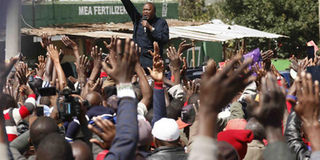Kenyan politics is the same swamp, same alligators’ fight

President Uhuru Kenyatta addressing a rally at Ol Kalou, Nyandarua County, during a voter registration drive on February 10, 2017. We will only start making headway when we start judging leaders by how hard working they are. PHOTO | SULEIMAN MBATIAH | NATION MEDIA GROUP
What you need to know:
- Our political class is made up of the same guys, many who have not had a new idea in more than 20 years.
- When they say they understand the problems of the people, it is safer to assume that they speak in figurative, not literal, terms.
When Raila Odinga was born in Maseno, on January 7, 1945, Kenya was just a little thicket with as many people (5,374,000) as there are in Nairobi today.
Of our population of 47,615,739 this year, about 30 million were not born in 1982, when Mr Odinga went into politics (by trying to boot out Daniel arap Moi in a coup).
At 72, Mr Odinga belongs to a cohort (70-100) that has some 842,689. The other 46 million is way younger.
Am I saying that Mr Odinga is a bad man and should not aspire to be President?
Absolutely not. Mr Mwai Kibaki was about the same age as Mr Odinga when he became President, and even with the health issues and the eccentricities, he was a reasonably decent President.
So Mr Odinga could conceivably be elected and turn out to be a good president.
My argument is that Kenyan politics, like its newspapers, is ageing and doing so to an extent that one is losing touch with the other.
If Kenya’s politics was a newspaper, we’d say it has a talent problem.
If it was an industry, it would be described as having monopolistic tendencies.
Kenyan politics is a small swamp where the same alligators have been battling one another for the carcass (us) for decades.
GOLDEN SPOON
The president in August is either going to be a re-elected Mr Uhuru Kenyatta, Mr Odinga, Mr Kalonzo Musyoka, Mr Musalia Mudavadi or Mr Moses Wetang’ula, depending on Nasa’s candidate.
If you want to know the reasons for our under-development, looking closely at the character, background, abilities and dispositions of these folks, is a good start.
Our political class is made up of the same guys, many of whom have not had a new idea in more than 20 years.
I want to suggest that the last time we had an infusion of new blood and fresh ideas in politics was in the 1990s when intellectuals moved in.
Mr Musyoka, 64, graduated from the University of Nairobi 40 years ago, was elected to Parliament 32 years ago and became an assistant minister a year later.
In terms of power and affluence, he has led a charmed life.
Mr Mudavadi, 57, has had gold spoons jostle for space in his privileged mouth.
His father, Moses Budamba Mudavadi, was a most powerful man in the inner circle of then President Daniel arap Moi, both as the Minister for Local Government and in Kanu.
When he died, his son, who had worked in government (at the National Housing Corporation) for a year and had been a director of Tysons for another four, inherited his seat and was straightaway appointed to the Cabinet as the Minister for Supplies and Marketing in 1989.
Thereafter, he has occupied every coveted position from the vice-presidency downwards.
OUT OF TOUCH
Mr Wetang’ula, 61, who has a snowball’s chance in hell of becoming president – it’s still a chance – is also a well-heeled and well-connected fellow who made his parliamentary debut in 1992 as a Kanu Nominated MP.
Mr Kenyatta is younger than those who want to succeed him, but he can truly be said to have spent his entire life at the table of power and great privilege.
All these good people may as well be trying to rule Martians.
They are from a class and generation in Kenya, which is rarefied and walled off from most of the people they want to lead.
When they say they understand the problems of the people, it is safer to assume that they speak in figurative, not literal, terms.
They really have no way of knowing what it is to come from nowhere, have nothing, have no one and be expected to fight for a place in this big, bad, cruel world.
They have no way of knowing what it means in this day and age to be broke and jobless.
The problem with Kenyan politics is that it is not regularly refreshed by a new flow of peasants who will bring a plucky energy, superior intellect, hunger for success and determination to the business of government.
In the current cohort of leaders you will find some of the least competitive, most laid back, fun-loving, laziest, albeit nice, folks alive.
ELECTION TIME
I want to suggest that Kenya will remain a corrupt Fourth World country, even though its people are reasonably enterprising and hard working, so long as ethnic pedigree and money remain the main qualifications you need to lead.
We will only start making headway when we start judging leaders by how hard working, effective, innovative as well as politically compliant (compassionate, fair, just and peaceful) they are rather than whether they come from our tribe and whether we like the goodies they dispense.
Voter registration is now closed and you are busy with your abacus totalling up the Jubilee and Nasa “strongholds”.
But it really makes no difference: same swamp, same alligators.





